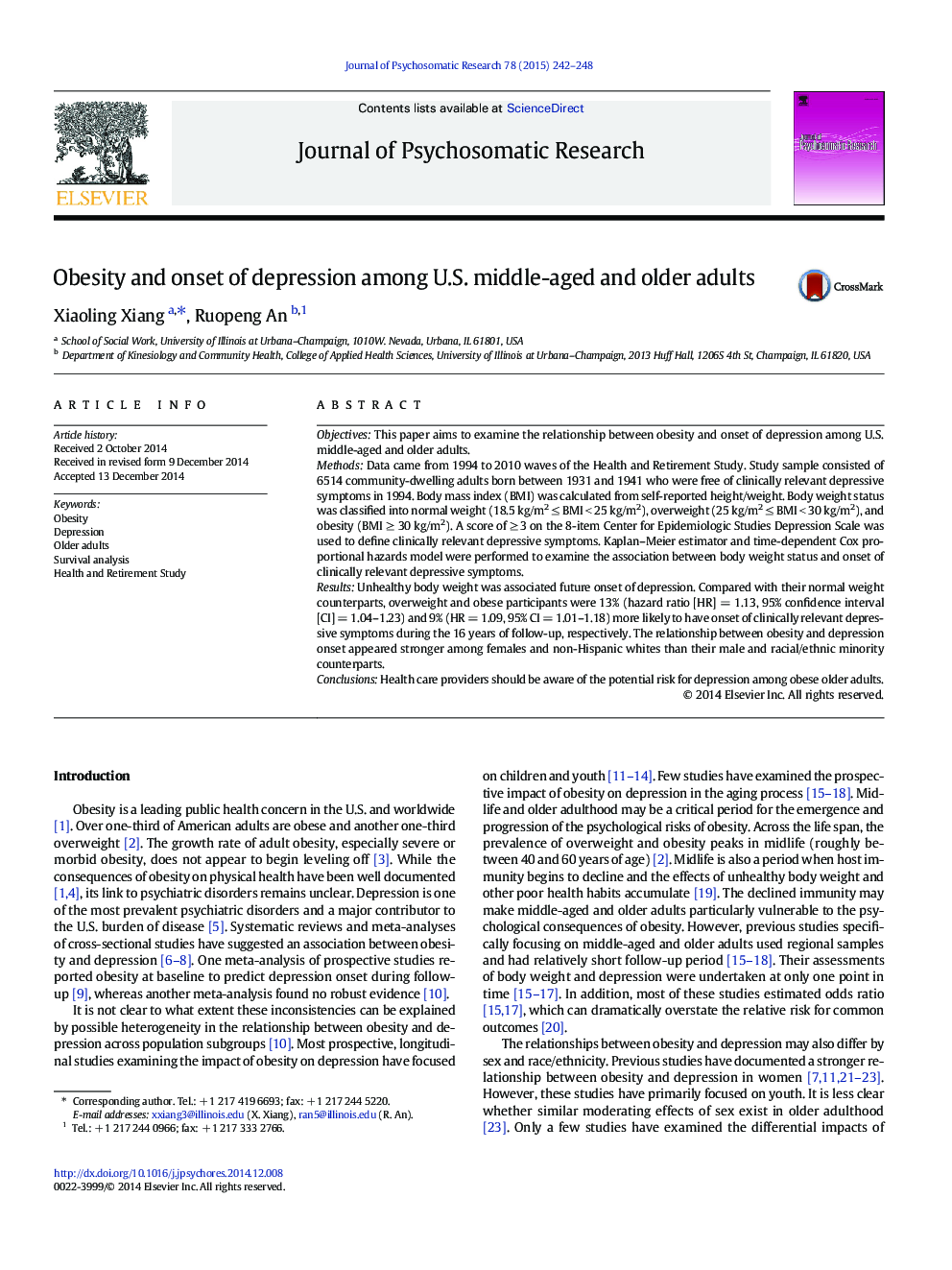| کد مقاله | کد نشریه | سال انتشار | مقاله انگلیسی | نسخه تمام متن |
|---|---|---|---|---|
| 10469507 | 926768 | 2015 | 6 صفحه PDF | دانلود رایگان |
عنوان انگلیسی مقاله ISI
Obesity and onset of depression among U.S. middle-aged and older adults
ترجمه فارسی عنوان
چاقی و آغاز افسردگی در میان میانسال وسالمندان ایالات متحده
همین الان دانلود کنید
دانلود مقاله ISI انگلیسی
رایگان برای ایرانیان
کلمات کلیدی
-
چاقی - افسردگی - سالمندان - تجزیه و تحلیل بقا - سلامت و مطالعه بازنشستگی -
فهرست مطالب مقاله
چکیده
کلید واژه ها
مقدمه
روش ها:
شرکت کنندگان
معیار افسردگی
اندازه گیری چاقی
تحلیل های آماری
شکل 1: هیچ ارتباط معناداری میان وضعیت وزن بدن و شروع افسردگی میان آمریکایی آفریقایی تبار غیر هیسپانتیک یا هیسپانتیک مشاهده نشد. میانکنش اضافه وزن و آمریکایی آفریقایی تبار از نظر آماری معنادار بودند.
جدول 1: ویژگی های نمونه بر اساس وضعیت وزن بدن خط پایه.
جدول 2: شروع علائم بالینی افسردگی در ارتباط با وضعیت وزن بدن در میانسالان و سالمندان.
جدول 3: شروع علائم بالینی افسردگی در ارتباط با وضعیت وزن بدن در میانسالان و سالمندان بر اساس جنسیت، و نژاد/قومیت.
بحث
کلید واژه ها
مقدمه
روش ها:
شرکت کنندگان
معیار افسردگی
اندازه گیری چاقی
تحلیل های آماری
شکل 1: هیچ ارتباط معناداری میان وضعیت وزن بدن و شروع افسردگی میان آمریکایی آفریقایی تبار غیر هیسپانتیک یا هیسپانتیک مشاهده نشد. میانکنش اضافه وزن و آمریکایی آفریقایی تبار از نظر آماری معنادار بودند.
جدول 1: ویژگی های نمونه بر اساس وضعیت وزن بدن خط پایه.
جدول 2: شروع علائم بالینی افسردگی در ارتباط با وضعیت وزن بدن در میانسالان و سالمندان.
جدول 3: شروع علائم بالینی افسردگی در ارتباط با وضعیت وزن بدن در میانسالان و سالمندان بر اساس جنسیت، و نژاد/قومیت.
بحث
ترجمه چکیده
اهداف: این مقاله به بررسی رابطه میان چاقی و
شروع افسردگی در میان بزرگسالان میانسال و مسن ایالات متحده می پردازد.
روش ها: داده ها از مطالعه سلامت و بازنشستگی انجام شده طی سالهای 1994 تا 2010 بدست آمد. نمونه مطالعه شامل 6514 سالمند ساکن در منزل که بین سالهای 1931 و 1941 متولد شده بودند و در سال 1994 هیچ علامتی از افسردگی نشان نمی دادند، می شد. شاخص توده بدنی (BMI) از روی نسبت قد به وزن گزارش شده توسط خود افراد، برآورد گردید. وضعیت وزن بدن اینگونه طبقه بندی گردید: وزن طبیعی( 18.5 kg/m2≤BMI
موضوعات مرتبط
علوم زیستی و بیوفناوری
علم عصب شناسی
روانپزشکی بیولوژیکی
چکیده انگلیسی
Objectives
This paper aims to examine the relationship between obesity and onset of depression among U.S. middle-aged and older adults.
Methods
Data came from 1994 to 2010 waves of the Health and Retirement Study. Study sample consisted of 6514 community-dwelling adults born between 1931 and 1941 who were free of clinically relevant depressive symptoms in 1994. Body mass index (BMI) was calculated from self-reported height/weight. Body weight status was classified into normal weight (18.5 kg/m2 ≤ BMI < 25 kg/m2), overweight (25 kg/m2 ≤ BMI < 30 kg/m2), and obesity (BMI ≥ 30 kg/m2). A score of ≥ 3 on the 8-item Center for Epidemiologic Studies Depression Scale was used to define clinically relevant depressive symptoms. Kaplan–Meier estimator and time-dependent Cox proportional hazards model were performed to examine the association between body weight status and onset of clinically relevant depressive symptoms.
Results
Unhealthy body weight was associated future onset of depression. Compared with their normal weight counterparts, overweight and obese participants were 13% (hazard ratio [HR] = 1.13, 95% confidence interval [CI] = 1.04–1.23) and 9% (HR = 1.09, 95% CI = 1.01–1.18) more likely to have onset of clinically relevant depressive symptoms during the 16 years of follow-up, respectively. The relationship between obesity and depression onset appeared stronger among females and non-Hispanic whites than their male and racial/ethnic minority counterparts.
Conclusions
Health care providers should be aware of the potential risk for depression among obese older adults.
ناشر
Database: Elsevier - ScienceDirect (ساینس دایرکت)
Journal: Journal of Psychosomatic Research - Volume 78, Issue 3, March 2015, Pages 242–248
Journal: Journal of Psychosomatic Research - Volume 78, Issue 3, March 2015, Pages 242–248
نویسندگان
Xiaoling Xiang, Ruopeng An,
